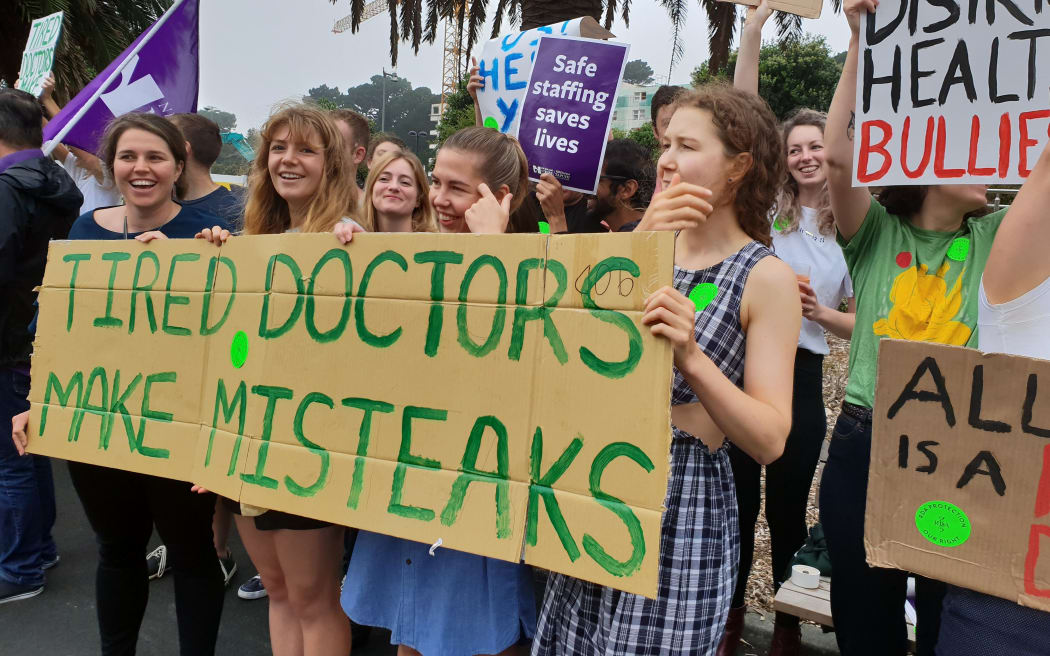Senior doctors, dentists who work in hospitals vote to strike

Senior doctors and dentists working in hospitals have voted to strike next month over their deadlocked pay negotiations.
In a notice to members, the Association of Salaried Medical Specialists said 82 percent have voted in support of the three strikes, with the first on 5 September between 12pm and 2pm.
That will be followed by another two-hour strike on 13 September and the third will be a four-hour strike on 21 September.
The union's executive director Sarah Dalton said senior clinicians have either had no pay rise at all, or pay rises that lag behind inflation since 2020.
She said they cannot continue to put up with pay cuts, particularly in view of the current staff shortages and recruitment problems.
"Te Whatu Ora will not even pay senior doctors and dentists the bare minimum to ensure their staff do not take a real-terms pay cut for the third year in a row," Dalton said.
"Every employee in New Zealand deserves to have the value of their income maintained, especially when they are performing critical frontline tasks and being asked to cover as many staffing shortages as our doctors currently are."
Dalton said the strikes had been timed in a way that would disrupt patients as little as possible.
"Te Whatu Ora and its funders are the target of these strikes, not patients," Dalton said.
"Doctors care about their patients but have decided failure to protect the value of their work will only result in more doctors leaving New Zealand or declining to apply for jobs here."
Association of Salaried Medical Specialists president Julian Vyas said the goodwill of doctors had been taken for granted for too long.
"At the same time, the system has ignored our concerns about short staffing restricting patient access to care and causing us overwork and burnout.
"For years and years, those in charge have failed to address the critical shortage of senior dentists and doctors, and simply expected us to keep putting up with it all this. And now, on top of everything else, we are being asked to swallow another real-terms pay cut."
This would happen no longer, Vyas said.
"Many of our colleagues have indicated they have had enough and are looking to leave the public health system either for overseas postings or to the private sector.
"This will leave the public sector further short staffed, meaning patients have even less access to care, and senior staff even more fatigued and burned out."
Te Whatu Ora has been contacted for comment.
Senior doctors and dentists working in hospitals have voted to strike next month over their deadlocked pay negotiations.
In a notice to members, the Association of Salaried Medical Specialists said 82 percent have voted in support of the three strikes, with the first on 5 September between 12pm and...
Senior doctors and dentists working in hospitals have voted to strike next month over their deadlocked pay negotiations.
In a notice to members, the Association of Salaried Medical Specialists said 82 percent have voted in support of the three strikes, with the first on 5 September between 12pm and 2pm.
That will be followed by another two-hour strike on 13 September and the third will be a four-hour strike on 21 September.
The union's executive director Sarah Dalton said senior clinicians have either had no pay rise at all, or pay rises that lag behind inflation since 2020.
She said they cannot continue to put up with pay cuts, particularly in view of the current staff shortages and recruitment problems.
"Te Whatu Ora will not even pay senior doctors and dentists the bare minimum to ensure their staff do not take a real-terms pay cut for the third year in a row," Dalton said.
"Every employee in New Zealand deserves to have the value of their income maintained, especially when they are performing critical frontline tasks and being asked to cover as many staffing shortages as our doctors currently are."
Dalton said the strikes had been timed in a way that would disrupt patients as little as possible.
"Te Whatu Ora and its funders are the target of these strikes, not patients," Dalton said.
"Doctors care about their patients but have decided failure to protect the value of their work will only result in more doctors leaving New Zealand or declining to apply for jobs here."
Association of Salaried Medical Specialists president Julian Vyas said the goodwill of doctors had been taken for granted for too long.
"At the same time, the system has ignored our concerns about short staffing restricting patient access to care and causing us overwork and burnout.
"For years and years, those in charge have failed to address the critical shortage of senior dentists and doctors, and simply expected us to keep putting up with it all this. And now, on top of everything else, we are being asked to swallow another real-terms pay cut."
This would happen no longer, Vyas said.
"Many of our colleagues have indicated they have had enough and are looking to leave the public health system either for overseas postings or to the private sector.
"This will leave the public sector further short staffed, meaning patients have even less access to care, and senior staff even more fatigued and burned out."
Te Whatu Ora has been contacted for comment.









Leave a Comment